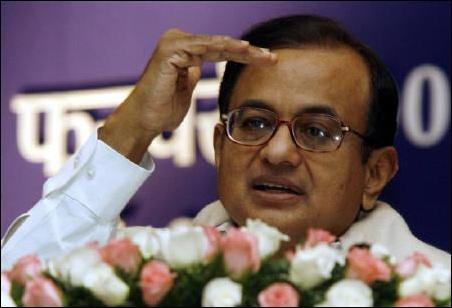
In the backdrop of rising cyber crime, Home Minister P Chidambaram disclosed today that the government proposed to create a national structure for cyber security and establish a National Threat Intelligence Centre.
"No one is immune to cyber crime and attacks," he said, recalling that there had been cyber attacks on the Prime Minister's Office, Central Bureau of Investigation and other government infrastructure.
"Discussions have been held and we are at an advanced stage of creating a national structure for cyber security. We are also thinking of setting up a National Threat Intelligence Centre," Chidambaram said.
. . .

Launching a report on cyber security prepared by software industry body Nasscom, he said there was a need to build capacity in various law enforcement agencies in cyber crime investigations and cyber forensics.
Chidambaram said dimensions of security problem increased manifold in the online space and 'we have to build lawful interception capabilities'.
The report, 'Securing Our Cyber Frontiers', by the National Association of Software and Services Companies and Data Security Council of India presented to Chidambaram by outgoing Nasscom Chairman Rajendra Pawar, has suggested setting up a national structure for cyber security, which would clearly define the roles and responsibilities of stakeholders.
. . .

It has also recommended establishing a National Threat Intelligence Centre, which would integrate all existing information sources.
"We have taken numerous steps to protect the physical infrastructure. . . I think all that we have done to protect the infrastructure in the physical space seems to be a lighter task than when we face threats that have been outlined in the cyber space," he said.
Chidambaram said the dimension of the security problem 'grows manifold in crimes on cyber space' with offences such as identity theft, hacking, financial fraud, child pornography and corporate espionage.
. . .

"From national security point of view, this is an important report and law enforcement agencies should quickly scale up capacity to deal with these new crimes," he said.
The minister, however, said some of the recommendations overlap with several ongoing initiatives of the government.
Nasscom and DSCI had constituted the Cyber Security Advisory Group, under the chairmanship of Rajendra Pawar, Kamlesh Bajaj as member secretary and experts from public and private sector and law enforcement.
. . .

The group was mandated to come up with recommendations for consideration by the government on public-private partnership in capacity building and policy making.
"Attacks on critical infrastructure supporting technology can have effects similar to those achieved by traditional wars.
"I believe the report will help the government create policy instruments and public-private partnership models for enhancing cyber security in the country," Pawar said.
Chidambaram said work is underway to 'prepare inventory critical information infrastructure.
. . .

'Testing labs for accreditation of ICT products are also being set up'.
"Cyber space is a national asset . . . the way forward is obviously to work together. While the government and government agencies will remain principal players, the undeniable fact is that there are millions of private players and the challenge to cyber security can not be met unless they work together," he said.
Other recommendations include designing and implementing a competency framework and setting up a Centre of Excellence for best practice in cyber security, besides establishing a cyber command within the defence forces.
"The cyber command should be equipped with defensive and offensive cyber weapons and manpower trained in cyber warfare," the report said.